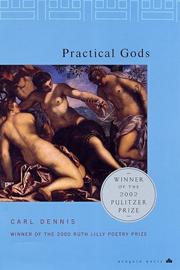| Listing 1 - 7 of 7 |
Sort by
|

ISBN: 0141002301 1101177268 Year: 2001 Publisher: Penguin
Abstract | Keywords | Export | Availability | Bookmark
 Loading...
Loading...Choose an application
- Reference Manager
- EndNote
- RefWorks (Direct export to RefWorks)

ISBN: 0142000833 1440650330 Year: 2004 Publisher: Penguin
Abstract | Keywords | Export | Availability | Bookmark
 Loading...
Loading...Choose an application
- Reference Manager
- EndNote
- RefWorks (Direct export to RefWorks)
Book
ISBN: 9780691177014 0691177015 0691192286 1400888468 Year: 2017 Publisher: Princeton: Princeton university press,
Abstract | Keywords | Export | Availability | Bookmark
 Loading...
Loading...Choose an application
- Reference Manager
- EndNote
- RefWorks (Direct export to RefWorks)
David Hume is widely regarded as the most important philosopher ever to write in English, but during his lifetime he was attacked as "the Great Infidel" for his skeptical religious views and deemed unfit to teach the young. In contrast, Adam Smith was a revered professor of moral philosophy, and is now often hailed as the founding father of capitalism. Remarkably, the two were best friends for most of their adult lives, sharing what Dennis Rasmussen calls the greatest of all philosophical friendships. The Infidel and the Professor is the first book to tell the fascinating story of the friendship of these towering Enlightenment thinkers--and how it influenced their world-changing ideas. The book follows Hume and Smith's relationship from their first meeting in 1749 until Hume's death in 1776. It describes how they commented on each other's writings, supported each other's careers and literary ambitions, and advised each other on personal matters, most notably after Hume's quarrel with Jean-Jacques Rousseau. Members of a vibrant intellectual scene in Enlightenment Scotland, Hume and Smith made many of the same friends (and enemies), joined the same clubs, and were interested in many of the same subjects well beyond philosophy and economics--from psychology and history to politics and Britain's conflict with the American colonies. The book reveals that Smith's private religious views were considerably closer to Hume's public ones than is usually believed. It also shows that Hume contributed more to economics--and Smith contributed more to philosophy--than is generally recognized. Vividly written, The Infidel and the Professor is a compelling account of a great friendship that had great consequences for modern thought.
Economic schools --- Hume, David --- Smith, Adam --- Philosophy, Modern --- Economists --- Philosophers --- Hume, David, --- Smith, Adam, --- Economists - Scotland - Biography --- Philosophers - Scotland - Biography --- Hume, David, - 1711-1776 --- Smith, Adam, - 1723-1790
Book
ISBN: 9781107045439 9781107045002 9781107622999 9781461953470 1461953472 1107045436 9781107671874 1107671876 9781306212311 1306212316 1107045002 1107622999 1139895001 1107703344 1107694493 1107598850 110770409X Year: 2014 Publisher: Cambridge : Cambridge University Press,
Abstract | Keywords | Export | Availability | Bookmark
 Loading...
Loading...Choose an application
- Reference Manager
- EndNote
- RefWorks (Direct export to RefWorks)
This is a study of the political theory of the Enlightenment, focusing on four leading eighteenth-century thinkers: David Hume, Adam Smith, Montesquieu and Voltaire. Dennis C. Rasmussen calls attention to the particular strand of the Enlightenment these thinkers represent, which he terms the 'pragmatic Enlightenment'. He defends this strand of Enlightenment thought against both the Enlightenment's critics and some of the more idealistic Enlightenment figures who tend to have more followers today, such as John Locke, Immanuel Kant and Jeremy Bentham. Professor Rasmussen argues that Hume, Smith, Montesquieu and Voltaire exemplify an especially attractive type of liberalism, one that is more realistic, moderate, flexible, and contextually sensitive than most other branches of this tradition.
Enlightenment. --- Liberalism. --- Liberal egalitarianism --- Liberty --- Political science --- Social sciences --- Aufklärung --- Eighteenth century --- Philosophy, Modern --- Rationalism --- Hume, David, --- Smith, Adam, --- Montesquieu, Charles de Secondat, --- Voltaire, --- Voltaire --- de Voltaire, F.-M. A. --- Vadé, Guillaume --- M. de V. --- Bazin --- Arouet, François Marie --- Mengdesijiu, --- Mongtētkiʻǣ, --- Monteskʹe, Sharlʹ Lui, --- Monteskīĭ, --- Monteskiusz, --- Monteskiyü, --- Monṭesḳyeh, --- Montesquieu, --- Montesquieu, Charles Louis de Secondat, --- Montesquiou, --- Montesukyū, --- Muntisikyū, --- Secondat, Charles-Louis de, --- מונטסקייה --- モンテスキウ̄, --- 孟德斯鳩, --- Arts and Humanities --- Philosophy
Book
ISBN: 0873380444 0873380436 Year: 1970 Publisher: [Kent, Ohio] The Kent State University Press
Abstract | Keywords | Export | Availability | Bookmark
 Loading...
Loading...Choose an application
- Reference Manager
- EndNote
- RefWorks (Direct export to RefWorks)
Book

ISBN: 9780674972896 0674972899 Year: 2016 Publisher: Cambridge, MA
Abstract | Keywords | Export | Availability | Bookmark
 Loading...
Loading...Choose an application
- Reference Manager
- EndNote
- RefWorks (Direct export to RefWorks)
Multi

ISBN: 9780674972896 Year: 2016 Publisher: Cambridge, Mass. Harvard University Press
Abstract | Keywords | Export | Availability | Bookmark
 Loading...
Loading...Choose an application
- Reference Manager
- EndNote
- RefWorks (Direct export to RefWorks)
| Listing 1 - 7 of 7 |
Sort by
|

 Search
Search Feedback
Feedback About UniCat
About UniCat  Help
Help News
News